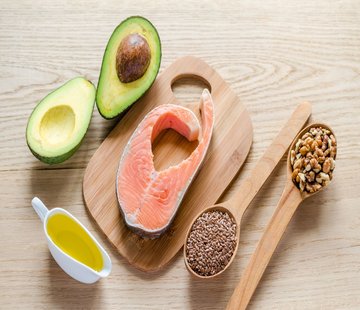
Debunked


The only ‘con’ of natural fat consumption is that these are calorie desne macronutrients and lack of self-dietary-control can result in overeating. Sans an active lifestyle with plenty of exercise this will in turn result in weight gain.
I can tell you there are very few things that give me as much satisfaction as this scenario, one which is all too common in my existence … “Wow you look SO SKINNY! Seriously what’s your secret?” To which I reply with as much smugness as I can muster, “Fat! A generous dollop of good, clean, old fashioned FAT.”
Fat was the macronutrient we demonized in the 60s and 70s and the result of that today is a worldwide obesity epidemic thanks to the whopping quantities of processed carbs, trans fats and sugar we’ve consumed instead. Several prominent scientists deemed saturated fat to be the aetiology (cause) of heart disease and this notion, which tragically was based on many inconclusive studies and inaccurate data interpretation, became the cornerstone of the “low-fat diet” myth.
What we have done unwittingly is removed these blessed saturated fats from our diets and replaced them with foods chocked full with trans fats and sugars. Trans fats are unsaturated fats that have been chemically modified to be more solid and have a longer shelf life. As far as my opinion goes, these are consumable poisons and are possibly the biggest culprit behind promoting metabolic syndrome conditions like high blood pressure, insulin resistance, high fat profiles, liver dysfunction and visceral fat accumulation as well as heart disease (these synthetic fats are what clog your arteries and not saturated fats). To avoid them, begin scanning the ingredients’ list on your food labels. If you come across the term ‘partially hydrogenated oils’, put that item right back on the shelf! Special mention to vegetable oils that top the list of the most toxic food items available due to their high content of trans fats.
The problem however is that we’ve only just scratched the surface of busting this myth. Government authorities and health organizations will continue to recommend a low-fat diet (even though it’s been a debacle for public health) simply because of the economics behind it. They are much too invested (and egoistic) to admit that this vilifying of saturated fat has been wrong and fuelled mostly by personal ambition, bad science, politics and much bias. There is much to be lost from slumping sales of Statins and Margarine and so they will continue to wage war on saturated fat. Don’t believe them, it’s a big FAT lie !

Juggling many roles from physician to writer to pilates instructor to Marketing-PR executive, Dr. Daamini is constantly pushed and inspired to get creative on how to encompass a Retreat into her daily life.
View Profile